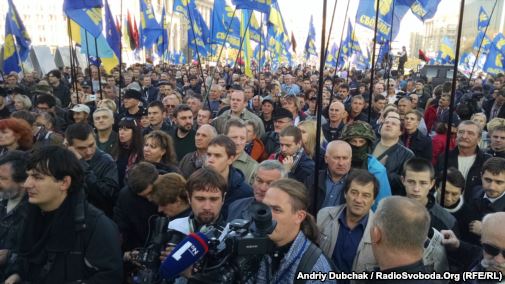The Verkhovna Rada session was followed by explosives, fire at the windows of the Parliament and clashes between the protesters and the law enforcement servicemen. The unrest started when the members of the Parliament refused to include the bill to deem the OUN-UPA a conflicting side in World War II, proposed by Svoboda party, on the daily agenda.
The square in front of the Parliament building was thick with Svoboda flags. Members of the Parliament, ‘regional’ Nestor Shufrych in particular, hinted at the fact that this political party had been the one to set up these provocations near the Verkhovna Rada.
“It is PR, it a sort of technology to raise the rating of one of the political forces who, as we see, has no chances for reelection to the Parliament,” Shufrych presumed.
Tyahnybok: Svoboda did not participate in the provocations
However, members of Svoboda deny their connection to the explosions and the clashes with the police. Oleh Tyahnybok claims the party is being set up.
“There were other flags besides Svoboda’s. Svoboda did not participate in the provocations. Not today or on any other day,” Tyahnybok assured.
In particular, the protesters had several flags belonging to the parties Right Sector and Bratstvo. However, both Right Sector and Bratstvo also deny their having anything to do with the provocations.
In the end Minister for Internal Affairs Arsen Avakov posted on his Facebook page that 17 policemen were injured in the clash, and the law enforcement arrest 37 “participants of the chaos.” Meanwhile his advisor Zoryan Shkiryak also noted on Facebook that near the Verkhovna Rada “a [Russian] FSB-developed scenario” was executed. According to him, “among the detainees is a police worker who was wearing a balaclava among the attackers.”
Yatseniuk: eat porridge in jail and not buy votes
Despite the unrest in the street, the members of the Parliament managed to approve the long-awaited laws. As such, the majority of the votes supported amendments to the Criminal Code, which increase liability for the violation of voting rights of the citizens, in particular, buying votes and falsifying the results. Prime Minister Arseniy Yatseniuk formulated the essence of the amendments.
“Those who hand out porridge and condensed milk have to consume porridge and condensed milk in jail, and not buy votes!” Yatseniuk emphasized.
The Verkhovna Rada also passed the anti-corruption law package. However, President Petro Poroshenko, who was present at the session, had to put in some effort to make the members of the Parliament concentrate.
“I am asking for your attention. Dear colleagues, I would like to ask you! The President of Ukraine is speaking!” Poroshenko said when taking about his bill regarding the creation of the Anti-Corruption Bureau.
Head of the Verkhovna Rada Oleksandr Turchynov also made an effort to motivate the members of the Parliament.
“I would like to request that the buffet be closed, so that we don’t lose responsible members of the Parliament there,” Turchynov announced.
The anti-corruption package
As such, the members of the Parliament managed to approve the second readings and the overall text of five anti-corruption laws within two hours: on the prevention of corruption, on the basis of the state anti-corruption policies, on the determination of the end beneficiary legal persons, on the counteraction to money-laundering and financing terrorism, as well as on the creation of the Anti-Corruption Bureau.
Among the upsides to the last law, chairman of the parliamentary committee for anti-corruption, UDAR member Viktor Chumak, emphasized the algorithm of appointing the head of the Anti-Corruption Bureau: three candidacies are determined by an independent competition committee, the President proposes one of these candidates to the Verkhovna Rada, and the Parliament approves the chairman of the bureau.
Meanwhile, according to the norms of law, experienced professionals will be unable to work for the Anti-Corruption Bureau, stated Prosecutor General Vitaly Yarema.
“The workers who spent the last five years working in anti-corruption and anti-organized crime departments will be unable to work for the Anti-Corruption Bureau. They need an appropriate degree. I don’t know where to get experts, if it is prohibited to get them from the office of the Prosecutor, the SBU and the Ministry of Internal Affairs,” Yarema claimed.
The Office of the Prosecutor was rid of its general surveillance function
Besides, the Verkhovna Rada approved the law on the Office of the Prosecutor. Batkivshchina faction head Serhiy Sobolev assured that the Prosecutor’s Office no longer has the right to intervene in civilian life, influence citizens and businesses.
“This law prescribes an entire complex of solutions which ban general surveillance on part of the office of the Prosecutor. So now it will do its direct duties: protect the interest of the state and present them in court,” Sobolev noted.
Also on this day, the Parliament, as proposed by the President, appointed Stepan Poltorak, formerly head of the National Guard, Minister of Defense.
The agenda of this plenary session included another two dozen bills. In particular, the one that was supposed to govern servicemen’s voting in the combat zone during the elections. However, due to the provocations near the Parliament building, Oleksandr Turchynov ended the session. He also stated he intended to call an emergency Verkhovna Rada meeting.




